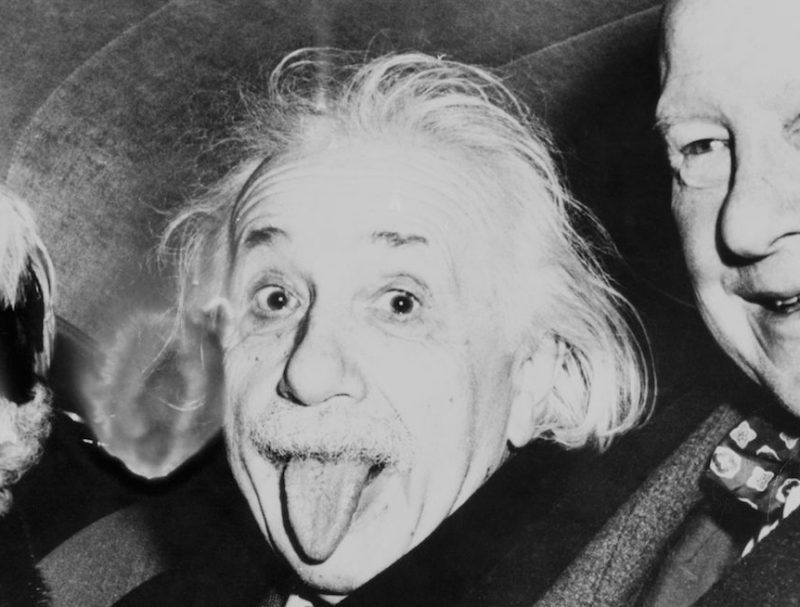
Einstein. It doesn’t take a genius to appreciate his legacy in the sciences (if not necessarily understand it in depth).
More than a half century after his death, he is still on everyone’s minds. On April 25 the National Geographic Channel will premiere a series based on his life, appropriately titled Genius and starring Oscar winner Geoffrey Rush as the wild-haired scientist. And yet how much do we truly know about one of the most influential thinkers of all time?
On what would have been his 138th birthday (he was born on March 14, 1879 in Ulm, Germany), here’s a quick guide to the man behind the myth.
A childhood that showed few signs of a brilliant future. There have long been legends that Einstein didn’t speak until age four. This seems highly unlikely—his grandmother wrote of Albert’s “droll ideas” when he was just two. However, the future intellectual icon was born with a “swollen, misshapen head and a grossly overweight body.” He struggled to fit in with other children and generally was considered withdrawn and idiosyncratic—he apparently would say an answer and then silently mouth it to himself—to the point there was a suggestion he was mentally handicapped. Academically, Einstein embraced mathematics and Latin, but did the minimum necessary on other subjects to avoid getting in trouble. He hardly had family connections either, as his father was a businessman who tended to struggle (though he did co-found a company that made electrical equipment). All in all, there was nothing to suggest the remarkable work to come, particularly after he dropped out of school.
A life gets on track. Despite having not completed high school, Einstein successfully won admission to Switzerland’s Eidgenössische Polytechnische Schule. (While an impressive feat, even this wasn’t an unqualified triumph: on the entrance exams he excelled at math and physics and failed biology, chemistry, and French.) Einstein then finished high school in Switzerland so he could enroll, eventually changing his citizenship from German to Swiss. He became more social and met his future first wife, the Serbian physics student Mileva Marić.
The “Miracle Year.” Einstein and Marić had a daughter out of wedlock, whose fate is lost to history. (Theories range from a quick death to being put up for adoption.) Einstein struggled to hold a job, much less earn enough to marry Marić. He wound up working as a patent clerk in Bern. In 1903, they finally wed (angering his mother for a number of reasons, including the fact that Marić was not Jewish). The couple had a son in 1904. Then in 1905 came his “miracle year,” as he revealed his theory of special relativity and published four major scientific papers, submitting a fifth for his doctorate. At 26, Einstein abruptly went from borderline unemployable to a man transforming science.
The world recognizes his genius. In 1915, Einstein published his theory of general relativity. (For a quick guide to this work that literally changed humanity’s understanding of the universe, click here.) He was awarded the Nobel Prize in Physics in 1921, though he did not receive it until 1922. Barely into his 40s, he was suddenly known around the globe.
Did he have help? Marić was a scientist in her own right. There is debate over how much she contributed to his efforts. Einstein himself suggested his wife played an important role when he wrote, “How happy and proud I will be when the two of us together will have brought our work on relative motion to a victorious conclusion.” That, however, was before they divorced in 1919.
Decades of frustration and failure to come. This is when the rapid progress of youth abruptly ceases. Einstein lived for over three more decades, dying on April 18, 1955 in Princeton, New Jersey. He spent much of this time attempting to develop a unified field theory, which phys.org describes as a “single field in which all forces are mediated and the properties of all particles – which at the time were only electrons and protons, with the neutron not discovered until 1932 – could be deduced.” He did not succeed. J. Robert Oppenheimer later declared, “During all the end of his life, Einstein did no good.”
A man who was more than science. Of course, even though the scientific breakthroughs stopped, Einstein still contributed to the world. Having moved to the United States in 1933 in the wake of Hitler’s rise, Einstein embraced the Civil Rights movement and attacked racism as a “disease of white people.” He strove to limit the spread of nuclear weapons and deeply regretted encouraging President Roosevelt to support the atomic bomb project: “Had I known that the Germans would not succeed in producing an atomic bomb, I would have never lifted a finger.”
All too often, a hard home life. Marić and Einstein divorced in 1919, having had a total of three children. Oldest son Hans Albert Einstein died in 1973 at 69, having spent much of his life a professor of hydraulic and sanitary engineering at the University of California, Berkeley. However, the younger boy, Eduard, suffered from schizophrenia and was eventually committed because of it, dying in 1965. Einstein married his first cousin Elsa Einstein Löwenthal in 1919 and they remained together until her death in 1936. Einstein was apparently unfaithful in both marriages. Albert acknowledged his personal life hadn’t always lived up to his professional one, writing to the son of a deceased friend: “What I admire in your father is that, for his whole life, he stayed with only one woman. This is a project in which I grossly failed, twice.”
—Sean Cunningham for RealClearLife
This article was featured in the InsideHook newsletter. Sign up now.